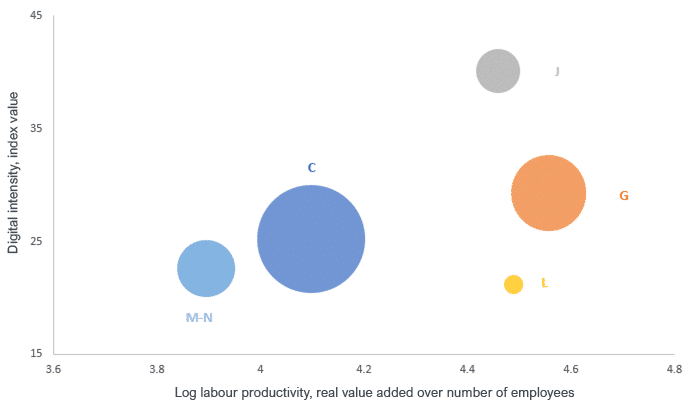A region’s competitiveness is manifested in the commercial success or failure of its companies. In essence, improving competitiveness means increasing productivity. European competitiveness and productivity growth have been deeply linked to the ability to promote innovation and use new technologies that are capable of transforming productive sectors and companies. In recent years, however, European investments have moved further and further away from the countries that lead technological innovation. Both GDP per capita and labour productivity in the Eurozone have increased more slowly than in the US. According to a study by the McKinsey Global Institute, between 2014 and 2019 European companies grew on average 40% slower than their US peers and invested 40% less in Research and Development (R&D). As a result, Europe’s ability to lead the world economy has weakened and this trend clearly needs to be reverted.[1]
For such a purpose, digitalisation is key. Figure 1 shows the positive relationship between digital technology and firm-level productivity. Thus, there is a close connection between the two variables: the use of digital technologies is positively associated with higher productivity.
Figure 1. Labour productivity and digitalisation (EU17)

Average labour productivity in the period from 2010 to 2016. Sectors: C = manufacturing; G = wholesale and retail trade; J = information and communication; L = real estate; and M-N = professional and administrative. Circle size indicates the average number of employees. Source: CompNet, with calculations by the author.
The EU is pursuing an ambitious agenda for regulating the digital economy, and it is now establishing a new package of regulations, including the Digital Markets Act (DMA), the Digital Services Act (DSA), the Artificial Intelligence Act (AIA) and the Data Act.[2] These regulations build on an already established structure of digital (eg, GDPR) and business rules in Europe that are comparatively more restrictive than in other leading economies. The risk is that the new regulations will hamper productivity gains and thus European competitiveness. The regulations will lead to new costs that go beyond direct compliance and administrative expenses. The main costs will be the dynamic and downstream economic effects spurred by their implementation.[3]
Therefore, a key question for Europe’s future success is how Europe designs its digital policy and how its digital economic performance can be improved. Unfortunately, there is a dearth of policy leadership from key EU member states on emerging technologies and what is needed to make them powerful in the European economy.
Stronger leadership from the D9+ group
This is the reason why the D9+ group should raise its profile. Launched in 2016, nine countries with a particular interest in questions of digital economy met to learn from each other and seek common ground on policy issues. Since its founding, the group has expanded[4] and now also includes ‘guest countries’, although it remains fundamentally an initiative of small and mid-sized open-oriented economies with a strong interest in exploiting the economic power of digitalisation and new emerging technologies.
D9+ countries have much in common: digital and general economic characteristics that should prompt them to foster digital openness further and to be far more ambitious in promoting Europe’s digital competitiveness.
The group’s members all think it is crucial for Europe to run an open digital economy with a broad space for entrepreneurial experimentation and intensive integration with the world’s leading digital regions. Finding the right direction for policy is of fundamental importance for Europe’s long-term economic growth, and the D9+ Group should take a leading role.
Therefore, D9+ countries should take on a greater leadership role in the development of digital regulations in Europe. In the last decade the voice of small and mid-sized open-oriented economies in Brussels has been challenged by a changing global landscape and new policies that have increasingly reflected the economic interests of the larger European economies. Hence, D9+ countries have a vital task before them: to be more proactive in developing new ideas on how European policy should evolve, advance the economic reforms that are necessary for deep digital integration and ensure that the voice of digitally open economies is heard at the negotiating tables when policy is decided upon in Brussels. For instance, it is now important to accommodate a ‘portfolio’ effect into the EU’s digital regulation: the entry of new and burdensome digital regulations should be balanced by policy reforms that facilitate the conditions for digital business.
The D9+ countries also have a clear role in establishing better frameworks in the EU for sharing experiences and learning from each other. EU countries have different experiences in technological specialisation and important knowledge to share and lessons to learn. Some of the D9+ countries are consistently ranked very high in global league tables on technology, innovation and digital competitiveness and bring economic and political experiences that are relevant for the general direction of EU policy. Therefore, these countries have a special responsibility to carve out a new function in EU digital policy-making that provides positive examples to be imitated. To do so, the D9+ also needs to update its processes and take specific action to further improve the way in which it works. For example, the group could prepare more comprehensive protocols, including an agenda for its meetings as well as a long-term work programme that should provide a clear link between individual D9+ meetings. This could be supported by the establishment of a permanent Secretariat for the D9+ Group with the capacity to evaluate its policy and performance, and to propose ways to improve the EU’s performance.
A winning Europe requires a stronger digital leadership from its member states, and the D9+ group should step in to fulfil the role in the future.
[1] See ECIPE (2022), ‘A compass to guide EU policy in support of business competitiveness’.
[2] The list is not exhaustive as there are other digital policies currently being discussed, such as the EU Cybersecurity Act, the Cyber Resilience Act, the Directive on improving working conditions in platform work and the Chips Act.
[3] ECIPE (2022), ‘After the DMA, the DSA and the new AI regulation: mapping the economic consequences of and responses to new digital regulations in Europe’.
[4] The current membership of the D9+ group includes Denmark, Finland, Sweden, the Netherlands, Luxembourg, Belgium, Spain, Ireland, Estonia, the Czech Republic and Poland.



